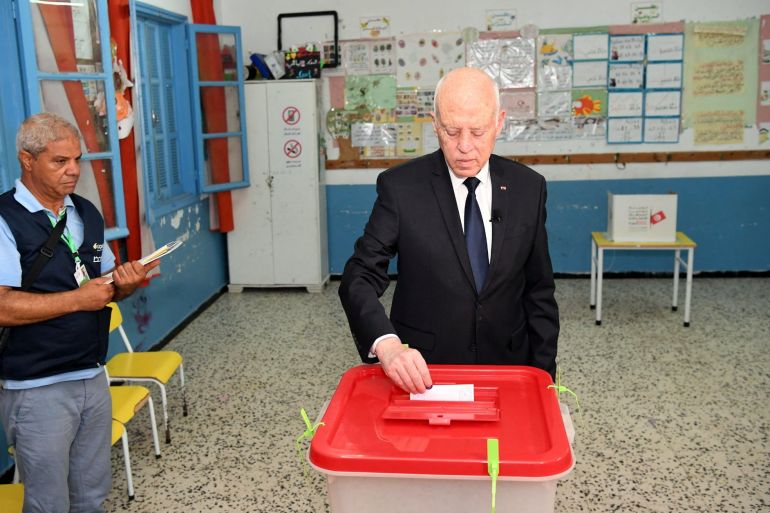New Tunisia electoral law ‘eliminates’ gender parity: HRW
New electoral changes, including ending public financing of campaigns, will make it difficult for women to run for office, critics say.

A new law introduced by Tunisian President Kais Saied’s government in September has “eliminated the principle of gendered parity” in elected assemblies, the United States-based group Human Rights Watch has warned.
The law passed on September 15 requires that candidates secure 400 signatures from registered voters in their constituencies.
Keep reading
list of 3 itemsTunisian protesters denounce ‘coup’, demand president steps down
Protests in Tunisia’s capital amid inflation, food shortages
“The new law strips gender parity provisions from a previous electoral law that strove to ensure equal representation between men and women in Tunisia’s elected assemblies, although Tunisia’s new constitution explicitly upholds this principle,” Salsabil Chellali, Tunisia director at HRW, said on Wednesday.
“Ensuring gender parity in elected assemblies was one of the major accomplishments for women’s rights following Tunisia’s 2011 revolution,” she added.
Moreover, the law bars election hopefuls from having their political campaigns financed publicly, which critics say favours men and those with wealthier backgrounds.
“These requirements especially disempower women who are less likely to have the same powerful local networks to sponsor their candidacy as men and the same financial means as their male counterparts. Together this is likely to contribute to their political exclusion,” Chellali noted.
Parliamentary elections in Tunisia are scheduled for December 17.
Opposition against Saeid
Last month thousands of Tunisians demonstrated in the capital, Tunis, denouncing Saied’s moves to consolidate political power and demanding accountability for the country’s long-running economic crisis.
Saied moved to rule by decree after shutting down parliament last year and expanding his powers with a new constitution passed in a July referendum.
Critics say his actions have undermined the democracy secured through a 2011 revolution that removed longtime leader Zine El Abidine Ben Ali and triggered the Arab Spring.
A worsening economic situation, compounded by supply shortages in the wake of Russia’s invasion of Ukraine in February, has agitated many in the North African country of 12 million.
Cash-strapped Tunisia is in talks with the International Monetary Fund for a bailout loan of about $2bn.